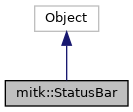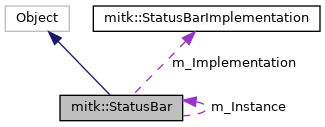Sending a message to the applications StatusBar.
More...
#include <mitkStatusBar.h>
|
| static StatusBar * | GetInstance () |
| | static method to get the GUI dependent StatusBar-instance so the methods DisplayText, etc. can be called No reference counting, cause of decentral static use! More...
|
| |
| static void | SetImplementation (StatusBarImplementation *instance) |
| | Supply a GUI- dependent StatusBar. Has to be set by the application to connect the application dependent subclass of mitkStatusBar if you create an instance, then call ->Delete() on the supplied instance after setting it. More...
|
| |
Sending a message to the applications StatusBar.
Holds a GUI dependent StatusBarImplementation and sends the text further. nearly equal to itk::OutputWindow, no Window, but one line of text and a delay for clear. all mitk-classes use this class to display text on GUI-StatusBar. The mainapplication has to set the internal held StatusBarImplementation with SetInstance(..).
Definition at line 33 of file mitkStatusBar.h.
◆ StatusBar()
| mitk::StatusBar::StatusBar |
( |
| ) |
|
|
protected |
◆ ~StatusBar()
| mitk::StatusBar::~StatusBar |
( |
| ) |
|
|
overrideprotected |
◆ Clear()
| void mitk::StatusBar::Clear |
( |
| ) |
|
removes any temporary message being shown.
◆ DisplayDebugText()
| void mitk::StatusBar::DisplayDebugText |
( |
const char * |
t | ) |
|
◆ DisplayErrorText()
| void mitk::StatusBar::DisplayErrorText |
( |
const char * |
t | ) |
|
◆ DisplayGenericOutputText()
| void mitk::StatusBar::DisplayGenericOutputText |
( |
const char * |
t | ) |
|
◆ DisplayGreyValueText()
| void mitk::StatusBar::DisplayGreyValueText |
( |
const char * |
t | ) |
|
◆ DisplayImageInfo() [1/2]
| void mitk::StatusBar::DisplayImageInfo |
( |
Point3D |
point, |
|
|
itk::Index< 3 > |
index, |
|
|
TimePointType |
time, |
|
|
const char * |
pixelValue |
|
) |
| |
◆ DisplayImageInfo() [2/2]
◆ DisplayImageInfoInvalid()
| void mitk::StatusBar::DisplayImageInfoInvalid |
( |
| ) |
|
◆ DisplayRendererInfo()
◆ DisplayText() [1/2]
| void mitk::StatusBar::DisplayText |
( |
const char * |
t | ) |
|
◆ DisplayText() [2/2]
| void mitk::StatusBar::DisplayText |
( |
const char * |
t, |
|
|
int |
ms |
|
) |
| |
Send a string with a time delay to the applications StatusBar.
◆ DisplayWarningText() [1/2]
| void mitk::StatusBar::DisplayWarningText |
( |
const char * |
t | ) |
|
◆ DisplayWarningText() [2/2]
| void mitk::StatusBar::DisplayWarningText |
( |
const char * |
t, |
|
|
int |
ms |
|
) |
| |
◆ GetClassName()
| virtual const char* mitk::StatusBar::GetClassName |
( |
| ) |
const |
|
virtual |
◆ GetInstance()
| static StatusBar* mitk::StatusBar::GetInstance |
( |
| ) |
|
|
static |
static method to get the GUI dependent StatusBar-instance so the methods DisplayText, etc. can be called No reference counting, cause of decentral static use!
◆ SetImplementation()
Supply a GUI- dependent StatusBar. Has to be set by the application to connect the application dependent subclass of mitkStatusBar if you create an instance, then call ->Delete() on the supplied instance after setting it.
◆ SetSizeGripEnabled()
| void mitk::StatusBar::SetSizeGripEnabled |
( |
bool |
enable | ) |
|
Set the SizeGrip of the window (the triangle in the lower right Windowcorner for changing the size) to enabled or disabled.
◆ m_Implementation
◆ m_Instance
The documentation for this class was generated from the following file:


